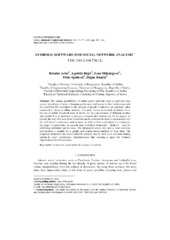Symbols: Software for Social Network Analysis
Чланак у часопису (Објављена верзија)
Метаподаци
Приказ свих података о документуАпстракт
The unique possibilities of online social networks such as real-time data access, knowledge of users’ changing preferences and access to their statuses provide the possibility for innovation in the analysis of people’s behavior and opinions, when compared to classical offline methods. Literature review shows lack of studies about the use of public Facebook data in Serbia for the improvement of different product sale, political or promotional campaigns, recommender systems, etc. In this paper, we present the way how data from Facebook can be collected in order to gain insight into the individuals’ preferences and statuses, as well as their connection to a company's fan pages. In particular, we present data collection framework – Symbols – used for collecting individual specific data. The framework stores data into a local database and involves a module for a graph and content-based analysis of these data. The proposed framework for social network analysis can be used as a decision-makin...g system in users’ preferences implementation thus creating a space for business improvements in various areas.
Кључне речи:
framework / social network analysis / facebook / digilabИзвор:
The Facta Universitatis, Series: Automatic Control and Robotics, 2018, 17, 3, 205-222Издавач:
- Niš: Univerzitet u Nišu
Финансирање / пројекти:
- Истраживања и развој Српске нето-нулте енергетске куће (RS-MESTD-Technological Development (TD or TR)-33015)
Колекције
Институција/група
IFDTTY - JOUR AU - Arsić, Branko AU - Bojić, Ljubiša AU - Milentijević, Ivan AU - Spalević, Petar AU - Rančić, Dejan PY - 2018 UR - http://rifdt.instifdt.bg.ac.rs/123456789/2348 AB - The unique possibilities of online social networks such as real-time data access, knowledge of users’ changing preferences and access to their statuses provide the possibility for innovation in the analysis of people’s behavior and opinions, when compared to classical offline methods. Literature review shows lack of studies about the use of public Facebook data in Serbia for the improvement of different product sale, political or promotional campaigns, recommender systems, etc. In this paper, we present the way how data from Facebook can be collected in order to gain insight into the individuals’ preferences and statuses, as well as their connection to a company's fan pages. In particular, we present data collection framework – Symbols – used for collecting individual specific data. The framework stores data into a local database and involves a module for a graph and content-based analysis of these data. The proposed framework for social network analysis can be used as a decision-making system in users’ preferences implementation thus creating a space for business improvements in various areas. PB - Niš: Univerzitet u Nišu T2 - The Facta Universitatis, Series: Automatic Control and Robotics T1 - Symbols: Software for Social Network Analysis IS - 3 VL - 17 SP - 205 EP - 222 DO - 10.22190/FUACR1803205A ER -
@article{
author = "Arsić, Branko and Bojić, Ljubiša and Milentijević, Ivan and Spalević, Petar and Rančić, Dejan",
year = "2018",
abstract = "The unique possibilities of online social networks such as real-time data access, knowledge of users’ changing preferences and access to their statuses provide the possibility for innovation in the analysis of people’s behavior and opinions, when compared to classical offline methods. Literature review shows lack of studies about the use of public Facebook data in Serbia for the improvement of different product sale, political or promotional campaigns, recommender systems, etc. In this paper, we present the way how data from Facebook can be collected in order to gain insight into the individuals’ preferences and statuses, as well as their connection to a company's fan pages. In particular, we present data collection framework – Symbols – used for collecting individual specific data. The framework stores data into a local database and involves a module for a graph and content-based analysis of these data. The proposed framework for social network analysis can be used as a decision-making system in users’ preferences implementation thus creating a space for business improvements in various areas.",
publisher = "Niš: Univerzitet u Nišu",
journal = "The Facta Universitatis, Series: Automatic Control and Robotics",
title = "Symbols: Software for Social Network Analysis",
number = "3",
volume = "17",
pages = "205-222",
doi = "10.22190/FUACR1803205A"
}
Arsić, B., Bojić, L., Milentijević, I., Spalević, P.,& Rančić, D.. (2018). Symbols: Software for Social Network Analysis. in The Facta Universitatis, Series: Automatic Control and Robotics Niš: Univerzitet u Nišu., 17(3), 205-222. https://doi.org/10.22190/FUACR1803205A
Arsić B, Bojić L, Milentijević I, Spalević P, Rančić D. Symbols: Software for Social Network Analysis. in The Facta Universitatis, Series: Automatic Control and Robotics. 2018;17(3):205-222. doi:10.22190/FUACR1803205A .
Arsić, Branko, Bojić, Ljubiša, Milentijević, Ivan, Spalević, Petar, Rančić, Dejan, "Symbols: Software for Social Network Analysis" in The Facta Universitatis, Series: Automatic Control and Robotics, 17, no. 3 (2018):205-222, https://doi.org/10.22190/FUACR1803205A . .



